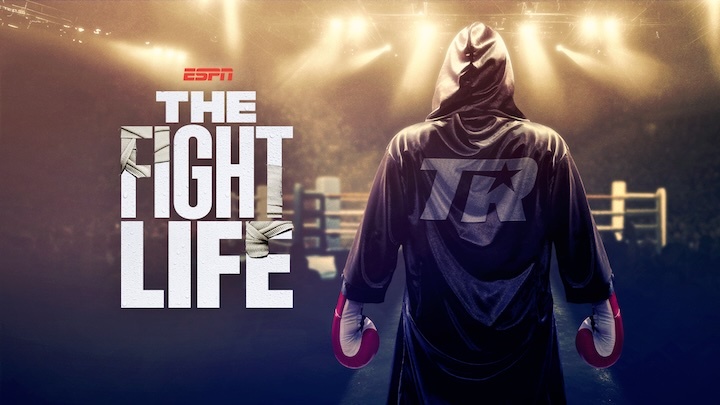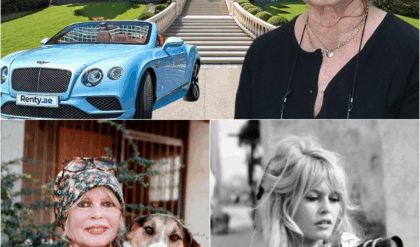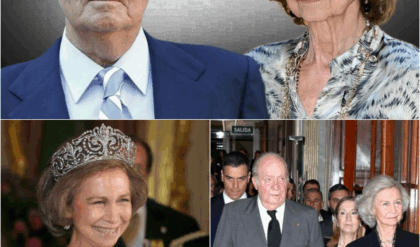
As an observer and fan of boxing, I never thought I’d be as interested in hearing what Todd duBoef has to say as I am in listening to Wladimir Klitschko.
Maybe that’s the secret sauce of “The Fight Life.”
In the first installment of the new, five-episode ESPN Original Series, which premiers Monday on ESPN+ (6 p.m. ET), “The Fight Life” attempts to offer not only a behind-the-curtain glimpse of the lead-up to a big fight – in this case, last May’s undisputed heavyweight championship epic between Oleksandr Usyk and Tyson Fury – but seemingly also provide viewers with a textured, visceral feel that is wholly unique to boxing.
The gauzy, slo-mo-heavy shots and cultivated sound bites from Teofimo Lopez Jr., Siniesa Estrada and Fury, among others – yes, this is a Top Rank joint – were to be expected. And, full credit, they’re well-executed. But where things actually get interesting are the fairly candid interviews and slices of life from Top Rank president duBoef, VP of operations and matchmaker Carl Moretti and director of communications Evan Korn.
“What I enjoy,” duBoef says, with perfectly delivered dramatic pauses, in what serves as the intro to Episode 1, “is a power that we in the sport have is the power to create goosebumps for the world.”
It’s actually a compelling thought – deeper analysis than we tend to get from a sport built on ego and artifice. And then, surprisingly – and delightfully – “The Fight Life” stays in this lane.
“This isn’t a normal world,” says Moretti. “Nobody wakes up and says, ‘I want to work in professional boxing.’ You’re dealing with guys that get punched in the face for a living – and that’s your business.”
The ridiculousness of the boxing business is confronted in Episode 1 by those on the inside in a way – head on – that I know I haven’t seen before. It’s refreshing, and it lends a bit more authenticity to the doc’s other scenes, which indeed pop from the screen.
“I have shame when I say I’m a promoter,” duBoef says with grim humor. “It’s like the bad word. They fucking say you’re the evil empire. That fucking bothers me.”
When duBoef steps into the back offices at Top Rank and shows off the promotion’s library of recorded fights – which dates back to 1966 and much of which was shot on 16mm reel that is packaged in old metal film cans stacked across rows of shelves – he appears genuinely touched by the opportunity to essentially walk through the aisles of boxing history.
More humility, a rarity in the sport:
While preparing French toast at his Aspen, Colorado, home for daughter Quinn, duBoef discusses his start in boxing and addresses his insecurities over being the stepson of the boss, Bob Arum. “I wanted to prove my worth,” he says.
From Arum himself, noting his own first steps in the sport, alongside heavyweight great Muhammad Ali: “I wouldn’t be in boxing – I wouldn’t be anything in this sport – if it wasn’t for Ali,” Arum said.
Korn is given the unenviable task of breaking the news to Top Rank fighter Nico Ali Walsh, grandson of “The Greatest,” that he would not be included on the Riyadh Season card for Fury-Usyk. Wryly, he asks the fighter, “Do you want the bad news or the bad news?”
Not to worry: “The Fight Life” cuts all those healthy, nourishing portions with the boxing equivalent of Jolt and cotton candy. The doc nearly crosses the line of glorifying the now-infamous incident in which John Fury, Tyson’s Falstaffian father, headbutts without provocation a member of Team Usyk who is half his size and a fraction of his age – and walked away with his own blood trickling down his face.
“No comment,” Fury says to the camera, after which, unprompted and in precisely the same breath, he offers further comment: “Listen, anybody gets in my face and disrespects my son – a heavyweight multi-world champion – they’re having it.”
Boxing, sometimes grandly described as the theater of the absurd, too often doubles as the theater of assholes.
Yet even when one of boxing’s witlessly fabricated, faux-alpha displays receives its undeservedly aggrandized moment in Episode 1, “The Fight Life” manages to tap a vein of raw humanity: After Tyson Fury emerges from a closed-door interview in the aftermath, smiling from ear to ear and pumping both fists high as chants of “Fury! Fury!” ring out, he immediately drops the vaudeville upon spotting his father: “Dad,” he says, his toothy grin replaced by genuine concern, “what’s happened to your head?”
It’s not the only time “The Fight Life” shows a different side of the father-son relationship than viewers are accustomed to seeing through the lens of boxing, When Ukraine’s Usyk phones back home in war-besieged Kiev two days before the Fury fight, the concern, pride and – yes – love visible on his face when he speaks to his wife and young son are laid bare for the camera. After casually asking whether his father cut his own hair ahead of fight night, Usyk’s son – himself under imminent threat from Vladimir Putin’s vanity and violence – tells him, “I have prayed for you once, and I will do that again later.”
Episode 1 goes on to share glorious footage of Usyk-Fury, along with interstitials of in-fight reactions from duBoef, both corners and others. And even if it’s a somewhat shameless plug for the fighters’ Dec. 21 rematch, back in Saudi Arabia, even cynical fans will be hard-pressed not to bite.
Promoters – a slander of sorts, in duBoef’s mind – are needed in boxing, no less so than the NFL relies on its commissioner or the NBA its league office. But in a sport with so many hangers-on and self-important side hustlers, the frank admissions and deflections back to the sacrifices of the men and women in the arena highlighted in the first episode of “The Fight Life” raise hopes for what’s to come over the remainder of the series.
“I don’t know that I have the understanding of what a boxer goes through the minute he walks into the ring,” duBoef said. “Where people are judging you on being the baddest man on the planet that night. And there’s no team. There’s no power forward. There’s no point guard. There’s no offensive linemen there. It’s you. You may have a corner, but at the end of the day, it’s you.”
Jason Langendorf is the former Boxing Editor of ESPN.com, has contributed to Ringside Seat and the Queensberry Rules, and has written about boxing for Vice, The Guardian, Chicago Sun-Times and other publications





